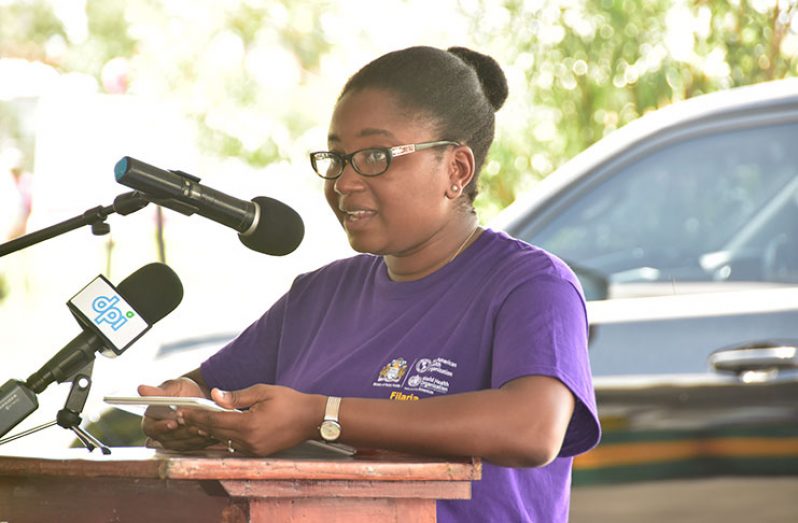…some 15 new cases recorded
ALTHOUGH the Vector Control Unit (VCU) of the Ministry of Public Health has made positive strides in its fight to eradicate Lymphatic Filariasis, statistics show that there is still a 90 per cent chance of infection and 15 new cases have been recorded.
Lymphatic Filariasis is also known as elephantiasis and is commonly called “Big Foot” in Guyana. The infection is reportedly one of the leading causes of long-term disability worldwide.

It is caused by three species of thread-like nematode worms, known as filariae – Wuchereria Bancrofti, Brugia Malayi and Brugia Timori.
In an effort to ensure these worms do not affect Guyanese, the VCU launched its Lymphatic Filariasis Mass Drug Administration (MDA) campaign on Saturday at the Square of the Revolution.
Head of Neglected Infectious Diseases Unit, VCU, Dr. Fabu Moses told members of the gathering that although the VCU has been working hard to eradicate the disease, people hardly notice the economic and social burden caused by the chronic signs of the infection.
Dr. Moses said a number of persons were discriminated against when the signs of the disease are visible. According to local statistics over 200 persons are infected with this disease and are possibly facing the stigma which the doctor spoke about.
According to the World Health Organisation (WHO), while the infection may be acquired during childhood, its visible manifestations may occur later in life, causing temporary or permanent disability.
“We need to ensure a bright future for our children but it also brought to light that we need to ensure that everyone in Guyana has access to the pills,” said Head of the Neglected Infectious Diseases Unit.
Pan American Health Organisation and World Health Organisation (PAHO/WHO) Representative to Guyana, Dr. William Adu-Krow reminded persons that it was important for the pills and medication to be administered properly and not wasted because its estimated cost is US$1M.
He however expressed his belief that the MDA programme will reduce the density of parasites circulating in the blood of infected persons and the prevalence of the infection within communities to such low levels that transmission cannot be sustained and new infections eventually cease.
Since the MDA programme was introduced in 2003, a number of persons have benefited, said Minister within the Ministry of Public Health, Dr. Karen Cummings.
She said it plays a pertinent part in their battle against the disease because since it was launched it helped to significantly reduce the prevalence of the disease.
“From more than 150 patients that we were seeing in the mid-2000s, now they are only about 15 patients who have to be actively managed at the clinic. Last year there were only 82 surgeries for hydrocele as compared to 447 in 2005,” said Chief Medical Officer, Dr. Shamdeo Persaud.
Dr. Cummings however pointed out that those results did not come without its fair challenges. She therefore commended the persons who were involved in the programme since its commencement in 2003.
She said there was still more to be done if the disease was to be eradicated so it was important to have shared interventions with other ministries, community-based groups and so forth.
PARTNERSHIP
In order to start that process, the Ministry of Public Health has partnered with the Ministry of Education to conduct the MDA. It was discovered that the group that did not meet the 65 per cent mark for taking medication to fight the infection were children.
Minister of Education Nicolette Henry, said it was an excellent idea to partner with the Ministry of Public Health in order to reduce the 65 per cent mark.
“School health education and promotion is intimate to educational achievement, quality of life and economic productivity,” she said, adding that during the campaign every parent or guardian would be furnished with a form that has important information on the campaign. It would also have a detachable sheet that parents and guardians would be required to fill-out and return to the child’s class teacher.
“You have to observe your child for signs of worm infestation; we have to teach healthy practices such as regular hand-washing especially after playing or using the toilet and before eating. We also encourage the use of shoes or footwear when they are out playing in the yard,” she said.
During the MDA programme there will be the distribution of long-lasting insecticidal bed nets and the distribution of tablets to every home across the country.



.jpg)










